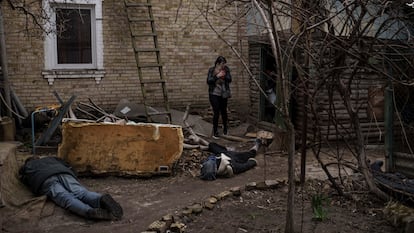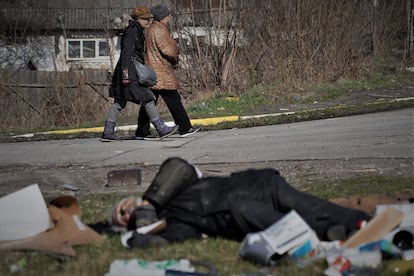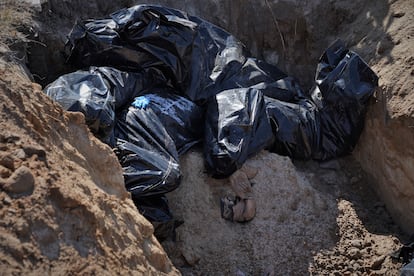Witnesses of the Bucha massacre: ‘The Russians are barbaric and inhumane’
The inhabitants of the Ukrainian town are slowly coming to terms with the terror they experienced at the hands of Russia’s troops. One recounts how a man was killed after yelling: ‘I’m a civilian, don’t shoot!’

Sasha, Kola, Pavel, Oleg… The inhabitants of Bucha are, bit by bit, completing the list of terror, putting faces to the drama. Completing the roll call of the residents whose bodies have appeared after the withdrawal of Russian troops last Thursday from this city, located northwest of Kyiv, is a painful but necessary process. The investigation into what happened here will come soon. Some of the victims were killed in cold blood with their hands tied, according to claims by the Ukrainian authorities and as has been observed by some witnesses. For Moscow, the whole thing has been staged.
The muddy ground that surrounds the Church of Saint Andrew in Bucha – home to some 35,000 people – now holds a mass grave in which the bodies are being laid. Some of them are wrapped in black bags, others in sheets, while there are some limbs that are poking out of the earth. Not far from there, the inhabitants of Yablunska street are still describing their shock at the discovery of 20 or so bodies after the Russian military left Bucha. The president of Ukraine, Volodymyr Zelenskiy, visited the city on Monday and called what had happened there “war crimes” and “genocide.”
Oleg, a cook aged around 30, left his house on March 19 to get firewood. He lives in a humble nine-story building, the tallest on Yablunska street. That’s why it was being used by the Russian snipers. It was the last time his neighbors would see him. His body appeared 10 days later with his hands tied with plastic. His case is another of those that have made the name of Bucha infamous all around the world.
The residents in the block, however, are not sure what could have happened to him. The most-detailed account is from Yaroslav, 50. He explains that Oleg would sometimes prepare barbecues and that the Russian soldiers who were in some of the homes in the building and nearby houses forced him to cook them a meal one day. They may have been dissatisfied with the result. Fearfully, he told them that he had a wife and four-year-old daughter. It was several days later that he left the basement in which he was sheltering with another 40 or so neighbors to get wood. Yaroslav heard him shout: “I’m a civilian, I’m a civilian, don’t shoot!” At the same time, five shots rang out as the Russians told him to stop. They never saw the cook again until his body was found face down next to the building on the day the Russians left. They don’t even know if he was there the whole time.

Yaroslav explains that when they rolled over the body, his guts fell out. The body was removed on Sunday, as were many of the dead from the massacre in Yablunska street. Luba, a 69-year-old resident, recounts with horror her version of the story standing next to the pool of blood and what is left of the intestines. She adds that a resident on the ninth floor died during these last weeks and that her body is still in the home. In Oleg’s apartment, on the fifth floor, his wife Natasha chooses not to speak. “No one understands why they killed him,” says Yaroslav. “The Russians are barbaric and inhuman. He didn’t behave aggressively and he was an intelligent person.”
Just next to this apartment block, there’s a newer development of homes that look more comfortable. Some of them have bullet holes and other damage from projectiles. Few windows remain. It was here that a Russian “general” was based, explain his neighbors these last weeks, Lida, 65, and husband Vasil, 66.
In the midst of all the commotion, filth and disorder, there is a sleeping bag and two packets of Russian army cookies. In one of the rooms, the Russian soldiers defecated everywhere, after the toilet became unusable due to a lack of water.

Through the next door, Lida shows the bag with firewood and the stove that she and her husband used on the balcony. But they had to be very careful, she adds, because the Russian snipers would stop anyone from turning on a light or lighting a fire from 5pm due to the curfew. The occupiers, meanwhile, destroyed the residents’ cellphones, as a number of residents in Bucha and nearby Irpin have complained.
In the same street in Yablunska, but a bit further on, Lesia and her husband Mujailo, both 65, offer more information. She reports that Sasha, a classmate of her daughter, is among the dead, as is another guy from the neighborhood called Kola. She also speaks of Pavel. Her husband adds that on Monday they found the bodies of Pavel’s son and grandson. “The Russians are not human, they are beasts,” the woman states, standing next to her house, which, at least, has not been damaged in the fighting. “Please, tell the truth, because in Russia they are living under a great lie,” she says.
Next to the church, Father Andrei Golovin is giving explanations to the reporters who have come to look at the grave where some of the bodies have been laid to rest – 68 in total, according to the priest. He says that they started to fill it with corpses on March 10, which coincides with the estimates made thanks to satellite images taken by the US company Maxar Technologies.
In the midst of the horror, however, life goes on. Everyone here is getting back to normal as best they can. Children and seniors cross the train tracks carrying food and water that is being supplied by municipal services and humanitarian organizations. Luda, the neighbor of victim Oleg, is going to the supermarket with another resident, Luba, 61. She is recalling how the Russians ordered them to go into the shelter and invokes the image of Adolf Hitler and the Jews.

The establishment they are headed to has been razed, and the damage from the war is clear to see. On the corner of the street, there is the body of a man who must be around 60, as well as a number of unopened food products around him. Luda and Luba pass by as if the body, which has been well preserved by the cold, were not there. They report it has been there for some time. They think it is a man from the neighborhood who lived alone and who was killed by the Russian soldiers.
After stepping over a carpet of broken glass, the supermarket itself looks like something from a movie. A lot of the shelves are empty, there are puddles on the floor and products scattered all over the place. The two women take some juice, cans of tomatoes and other supplies. They admit that what they are doing is wrong, but at the same time, they say they have no choice. A cat is sitting on one of the cash registers and miaows as it observes them.
Tu suscripción se está usando en otro dispositivo
¿Quieres añadir otro usuario a tu suscripción?
Si continúas leyendo en este dispositivo, no se podrá leer en el otro.
FlechaTu suscripción se está usando en otro dispositivo y solo puedes acceder a EL PAÍS desde un dispositivo a la vez.
Si quieres compartir tu cuenta, cambia tu suscripción a la modalidad Premium, así podrás añadir otro usuario. Cada uno accederá con su propia cuenta de email, lo que os permitirá personalizar vuestra experiencia en EL PAÍS.
¿Tienes una suscripción de empresa? Accede aquí para contratar más cuentas.
En el caso de no saber quién está usando tu cuenta, te recomendamos cambiar tu contraseña aquí.
Si decides continuar compartiendo tu cuenta, este mensaje se mostrará en tu dispositivo y en el de la otra persona que está usando tu cuenta de forma indefinida, afectando a tu experiencia de lectura. Puedes consultar aquí los términos y condiciones de la suscripción digital.








































